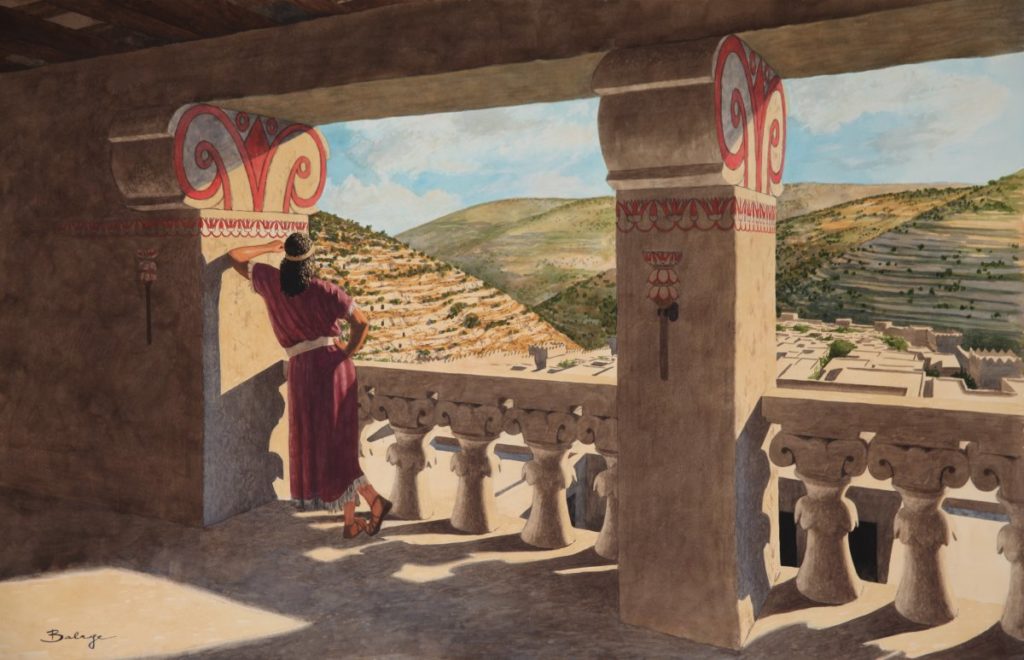
King David, You, Me and Idleness
It isn’t as if King David opened his eyes that morning, to ask, “What are the 3 most effective ways I can take this blessed God-Given-Life and invoke the worst conceivable miseries upon me and on everyone I love, am obligated to?”
Or “How can I best take the sacred anointing I was gifted with and immerse it in the depths of depravity?”
Every time I read the tragic account of David, I feel profound sympathy for this courageous warrior, this great leader consecrated by God as he falls victim to momentary temptation, for the horrifying dispersion of the consequences of his acts upon Israel and for each one of us.
I muse frequently about those first words.
in the book of Samuel.
‘It was the new year and the month that the Kings went to battle but David sent Joab and all his officers and all of Israel and remained in Jerusalem.’
This image by Balage Balogh conveys a man with time on his hands, idly viewing his domain. Pregnant with those first few moments before his gaze lands on another man’s wife, beautiful, oblivious of the fact that the King standing high above the city on his veranda sees and desires her…is ravenous for her.
The story is clearly allegorical…or more precisely, functions as a mirror.
From my very first reading of Samuel’s words there is more than sadness. Instead, there is recognition: A profoundly heartrending understanding of his actions. I see myself…all of us, perhaps even you.
Although his duty as a King was to be with his soldiers, David decided not to go with them. Most likely he had never stayed back before; perhaps he was feeling his age; or had a touch of the flu.
I can easily place ourselves in the shoes of this man. As can you. If we listen, we hear echoes of our voices crying out, “I deserve this!”
Which of us has never callously disregarded what we know to be right for reasons which even the noonday sun can never illuminate?
And then stood horrified at the consequences?
Aghast at what we have done, because of one single misstep?
One decision to relax, enjoy, forget, a momentary lapse to reward ourselves?
King David feels like a friend.
So much so that the ancient Israeli King appears in two of my novels. He helped me win an inner battle of putting flesh and bone to a character so far outside my experience that writing about him felt impossible.
The notion of the ancient warrior’s interest in and friendship for another warrior did not seem far-fetched. Risky, I knew but fitting.
The assassin named Joe Cairns, antagonist in The Price of Genius and Malthus Revisited, the last two books in the Lindsey McCall mystery series, became one of my very favorite characters. The eerie friendship between King David and Joe makes the reader like, even love Joe despite his decision to become a hired killer. At least that is what I have been told by more than a few.
Returning to idleness, it is personal.
Long before I converted to Christianity, there was something dark and dangerous, even ominous about too much time on my hands. My mother’s incapacity to find new purpose post-children served as instruction to me. Bored and depressed, she lost purpose and could not find her way out.
Unhappiness seemed to haunt my mother; the key to happiness eluded her and therefore served as magnet to me. Over time, inactivity and idleness became habitual and caused her horrendous medical and psychological problems.
St. Benedict takes it so seriously that he writes this: Idleness is the enemy of the soul. It is the first sentence of Chapter 48: On the Daily Manual Labor in the Rule of Benedict.
Note his choice of article. Back in the fifth century, the saint knew called the problem of too much time on our hands not one of many but the , singular, enemy of our souls.
Contrast the fifth with our own century…the almost frightening amount of leisure time given to most Americans. We seem, at times, to revel in idleness and to decry work. And then to rail in anger and futility against the unavoidable consequences.



